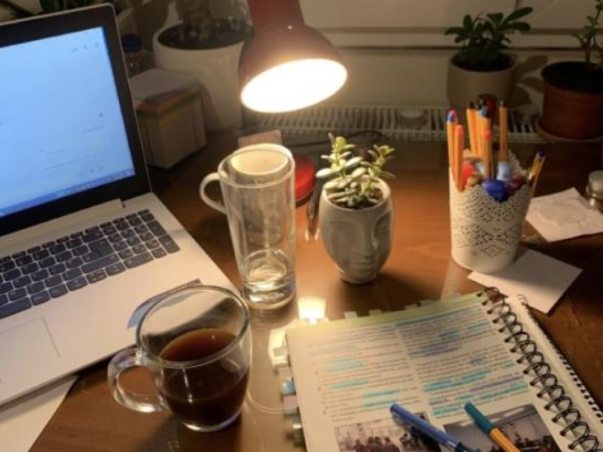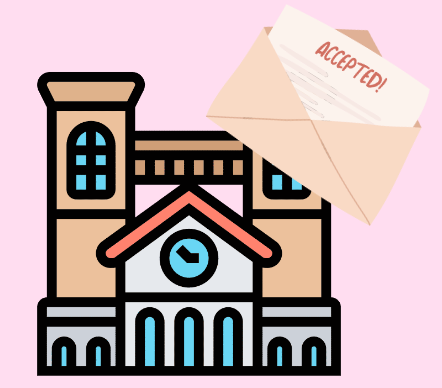Defeat procrastination by following these simple steps
If you find yourself struggling with procrastination (which many people do), this article is for you.
Defeat procrastination by following these simple steps
Do you ever find yourself mindlessly scrolling through TikTok, Instagram, or any other social media app when you know you should be doing homework or studying for your test tomorrow?
I have, too. I’m writing this article not only for myself but for those who also struggle with procrastination habits. In the middle months of school, homework and study loads begin to increase while students’ motivation levels tend to do the opposite. Quizzes, exams, and essays begin to fill our minds with the thought of possible failure, and at the moment, we don’t know what to do about it. Hopefully, this article can help you in that time of need.
Everyone deals differently with stress. Some decide to nap in the meantime, some might distract themselves, and others may try to hide it by avoiding communication with their surroundings. People have the free will to deal with stress however they’d like, as long as they get right back on task either after a period of time, or reassure themselves they’ll be okay, which they are.
So, what are some ways you can get right back on task?
-
Set a timer.
Make this timer short. Set an alarm on your phone, computer, or any device you’d prefer to use. If you want to get right back on task but can’t, make a short timer of about 10 minutes or so (but it’s completely up to you). In that time, you’re free to do whatever you want; take a step out of your room to use the bathroom, grab a snack and/or drink, or talk to your family. Make sure to keep the timer with you.
The timer dings. Now what?
If this timer is on your phone, don’t be fooled: it’s really easy to get distracted from there. Turn off the timer, and if you really can’t help yourself, give your phone to a parent or sibling afterward who will hold onto it for you, or put it somewhere far from your study place. Trust them to let you know when your timer goes off (if you set another one for studying). If you don’t have anything to set a timer, simply watch the clock and plan ahead to what times you’ll start and stop. Bring a snack and/or drink with you back to your study place, and make sure you don’t have to use the bathroom, so you don’t have an excuse to get up. Once you’re set and ready to go, start your timer from about a half hour to a full hour, and begin working.
If you finish before the timer is done, congratulations! You’re free to go. If you’re not and the timer goes off, add some final touches and reset the timer to 10 minutes, then repeat the process.
“Growing up planners were really helpful,” Librarian Ms. Castillo said. “Just being able to structure what I was going to be doing with my day and my time [was helpful]. Another thing I would be doing is I would probably take a break, maybe go on a walk, and then getting started on the task that I need to do. So, I think just kind of preparing yourself mindfully is the best way to get out of procrastination or some sort of block.”
-
Tune a song.
A lot of people enjoy doing homework and studying when they have some background music; research on Healthline states it rewards your brain with something you enjoy and motivates you to complete your tasks, quoting research results as well; “Listening to relaxing music makes a physical difference to the way people respond psychologically and physically — in terms of hormone response — under stress.”
People at work, school, and even civilians on the sidewalk tune in to their favorite song or podcast while they exercise. Students at school usually use their wired headphones or airpods when in the hallway or during independent work, while some labor workers listen to music all day at work.
So, what harm will a good song do? Unless you find yourself getting distracted from this music, perhaps look for songs with no lyrics to help you. Otherwise, you can turn down the volume or put your headphones down to work instead. Every ten minutes to half an hour, listen to about a song or two as a reward/break. Once those songs finish, go back to working and repeat until your tasks are complete.
Here are some playlists if you’re actively searching for some.
- study sesh –@burkie490 on Spotify
- lofi 4 studying –@suri on Soundcloud
- taylor swift instrumental for studying –@ana on Spotify
- romanticizing studying playlist –@azelia on YouTube
-
Work with a friend.
Maybe you just can’t focus while you’re alone and thrive for the company of someone working with you, or simply just being there for you when you need help. Facetime a friend or invite them over; They can motivate you when you’re feeling down and can help you look forward to the positives once you finish your work. You can help motivate them as well if they feel they’re struggling; that’s what friends are for!
However, some friends can bring you off task if you find them trying to conversate with you about unrelated topics from your work. If this is the case, tell your friend politely you need to focus, and if they persist in distracting you, leaving would be the best option. From there, try finding other people to study with.
-
Grab a snack and/or a drink.
This step may be combined with many others on this list, but it can also be the only thing you need: snacks! Sometimes, people find eating helpful because they’ll be satisfied by the delicious taste of a snack while doing work and/or because it’ll provide them with more energy. If you’re looking for energy, eating something healthy will benefit you the most.
Don’t forget your drink! Aside from coffee, there are many health benefits to drinking water, like increasing your concentration.
-
Go out somewhere.
Sometimes, being away from home can be helpful. It can take you away from the noises you’re used to hearing every day. Coffee shops and local libraries would be the places for you. They’re actually the most common places where high school and college students work; it’s a peaceful environment where you can have a drink right by your side, a friend or two next to you, and/or some music.
Dunkin’ Donuts is a popular place for studying. People like to grab a donut or two and a cup of coffee while they work; I see it just about any time I go to Dunkin’, Starbucks, and even fast food places like McDonald’s. They’re good study spaces as long as the area doesn’t smell too bad.
-
Think about the positives.
There are so, so many more ways to help yourself get back on task such as working out, talking to family members, reaching out to counselors, etc. Whatever you use can help you get better at not only avoiding procrastination but using your time wisely even when you don’t have work. There are thousands of activities and things you can do when this is the case… look forward to that!
“I like to reward myself for getting things done early, ‘cause I work well when either I’m under pressure, which is why I wait ‘til the last second but also because a lot of procrastination comes from the sense of perfectionism. So, just accepting that things don’t have to be perfect, like, good enough is good enough.” Librarian Ms. Greener said. “Rewarding yourself with, like, the small things when you finish it [is very beneficial].”
You may have something planned on a day when you’ve got a lot to do, for example, going shopping. There are two (productive) decisions to make: finish the work and try to make the planned event happen, or skip the plan entirely. Sometimes it’s possible to finish and then go out, but because others know they wouldn’t be able to concentrate if they have other things to do later, they skip one thing or the other.
It all depends on your skill in time management, which can increase if you’re dedicated to improving it. Reaching out to your counselors, teachers, and even librarians could help not only yourself, of course, but it can build a connection between you and your teacher(s) from the benefits of communication.

Grace is a Junior at Niles North. She joined NSN after a spark of interest in journalism as a future career and writing as her favorite hobby.







